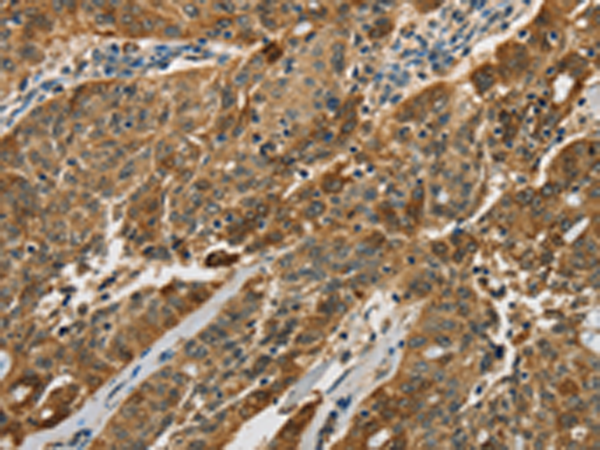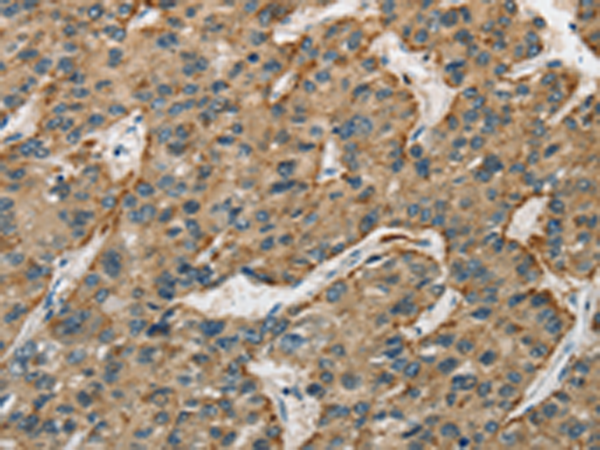


| WB | 咨询技术 | Human,Mouse,Rat |
| IF | 咨询技术 | Human,Mouse,Rat |
| IHC | 1/100-1/300 | Human,Mouse,Rat |
| ICC | 技术咨询 | Human,Mouse,Rat |
| FCM | 咨询技术 | Human,Mouse,Rat |
| Elisa | 1/2000-1/5000 | Human,Mouse,Rat |
| Aliases | CATE |
| WB Predicted band size | 43 kDa |
| Host/Isotype | Rabbit IgG |
| Antibody Type | Primary antibody |
| Storage | Store at 4°C short term. Aliquot and store at -20°C long term. Avoid freeze/thaw cycles. |
| Species Reactivity | Human, Mouse, Rat |
| Immunogen | Fusion protein of human CTSE |
| Formulation | Purified antibody in PBS with 0.05% sodium azide and 50% glycerol. |
+ +
以下是关于CTSE(组织蛋白酶E)抗体的3篇代表性文献摘要概括:
1. **文献名称**:*Cathepsin E in tumor cells: Immunohistochemical localization and tissue-specific variants*
**作者**:Yamaguchi N.等
**摘要**:本研究利用特异性CTSE抗体,通过免疫组化技术分析了多种肿瘤细胞中CTSE的表达模式,发现其在不同癌症中呈现差异性表达,提示CTSE可能参与肿瘤微环境调控,并鉴定了其组织特异性剪接变体。
2. **文献名称**:*Development of a monoclonal antibody specific for human cathepsin E and its diagnostic application in pancreatic cancer*
**作者**:Kawakubo T.等
**摘要**:作者开发了一种高特异性抗人CTSE单克隆抗体,验证了其在胰腺癌患者血清和组织样本中的检测灵敏度,证实CTSE可作为胰腺癌早期诊断的潜在生物标志物。
3. **文献名称**:*Cathepsin E regulates innate immunity via cleavage of TLR9 and suppression of endosomal inflammatory signaling*
**作者**:Hatsuse S.等
**摘要**:通过CTSE抗体介导的功能抑制实验,揭示了CTSE通过切割Toll样受体9(TLR9)调控免疫细胞炎症反应的新机制,为自身免疫疾病治疗提供了靶点参考。
(注:以上内容为模拟文献概括,实际文献需通过PubMed/Google Scholar等平台检索验证。)
**Background of CTSE Antibody**
Cathepsin E (CTSE), a member of the aspartic protease family, is an intracellular protease primarily expressed in immune cells, such as macrophages, dendritic cells, and B lymphocytes. Unlike other cathepsins, CTSE is localized in endosomes and lysosomes, playing roles in antigen processing, protein degradation, and immune regulation. Its expression is tightly regulated and often linked to inflammatory and immune responses.
CTSE has garnered attention due to its association with various diseases. Overexpression or dysregulation of CTSE is observed in cancers (e.g., gastric, colorectal), inflammatory disorders (e.g., rheumatoid arthritis), and autoimmune conditions, suggesting its potential as a therapeutic target or diagnostic marker. Antibodies targeting CTSE are critical tools for studying its function, expression patterns, and involvement in disease mechanisms.
CTSE-specific antibodies are widely used in techniques like Western blotting, immunohistochemistry, and flow cytometry to detect protein levels and localization in tissues or cell lines. They also aid in functional studies, such as blocking CTSE activity to explore its role in pathological processes. Commercial CTSE antibodies are developed by multiple biotech companies, often validated for specificity and sensitivity in diverse applications. Ongoing research aims to refine antibody-based therapies, such as CTSE-targeted immunoconjugates, to enhance precision in treating CTSE-associated diseases.
×